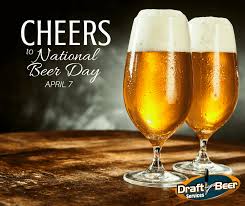Introduction:
National Beer Day is an annual celebration observed in various countries around the world, dedicated to honoring the art, culture, and enjoyment of beer. Held on April 7th, National Beer Day brings together beer enthusiasts, breweries, and communities to celebrate the rich history and diverse flavors of this beloved beverage. This essay will delve into the origins, significance, traditions, and impact of National Beer Day, exploring its role in promoting camaraderie, fostering cultural exchange, and supporting the beer industry.
- Origins of National Beer Day:
- The origins of National Beer Day can be traced back to the United States, where it commemorates the repeal of Prohibition, a period in American history when the production, sale, and consumption of alcoholic beverages were prohibited from 1920 to 1933.
- On April 7th, 1933, President Franklin D. Roosevelt signed the Cullen–Harrison Act, which allowed the sale of beer with an alcohol content of up to 3.2% by weight, effectively marking the end of Prohibition.
- The legalization of beer sales on April 7th, 1933, was met with widespread celebration across the country, as people rejoiced in the return of legal access to their favorite beverage after years of prohibition.
- Significance of National Beer Day:
- National Beer Day holds significance as a day to celebrate beer’s cultural, social, and economic importance. It serves as a reminder of the resilience of the brewing industry and the enduring popularity of beer as a staple of social gatherings and celebrations.
- Beyond its historical roots, National Beer Day provides an opportunity to recognize the contributions of breweries, brewmasters, and beer enthusiasts to the craft beer movement, which has flourished in recent decades with a focus on quality, innovation, and diversity of styles.
- Additionally, National Beer Day fosters a sense of community among beer lovers, who come together to share their passion for beer, explore new brews, and support local breweries and pubs.
- Traditions and Customs:
- National Beer Day is celebrated in various ways, depending on cultural norms, regional preferences, and individual preferences. Some common traditions and customs associated with National Beer Day include:
- Beer tastings and festivals: Many cities host beer tastings, festivals, and events where attendees can sample a wide variety of beers from local and international breweries.
- Brewery tours: Breweries often open their doors to the public, offering guided tours, tastings, and behind-the-scenes glimpses into the beer-making process.
- Pub crawls: Beer enthusiasts may organize pub crawls, visiting multiple pubs or bars in a single evening to sample different beers and enjoy the convivial atmosphere.
- Homebrewing: Some people celebrate National Beer Day by brewing their own beer at home, experimenting with recipes, ingredients, and brewing techniques.
- Beer and food pairings: Many restaurants and breweries offer special beer and food pairing menus, highlighting the complementary flavors of beer and various culinary dishes.
- National Beer Day is celebrated in various ways, depending on cultural norms, regional preferences, and individual preferences. Some common traditions and customs associated with National Beer Day include:
- Impact of National Beer Day:
- National Beer Day has a positive impact on the beer industry, local economies, and communities. It provides a boost to breweries, pubs, and related businesses, generating revenue and stimulating tourism.
- By promoting beer culture and appreciation, National Beer Day supports the growth of the craft beer movement, encouraging innovation, creativity, and quality standards in beer production.
- National Beer Day also fosters social connections and community engagement, as people come together to share a pint, exchange stories, and forge new friendships over their mutual love of beer.
- Moreover, National Beer Day contributes to the preservation of beer heritage and traditions, ensuring that the art of brewing continues to thrive and evolve for future generations to enjoy.
- Challenges and Controversies:
- Despite its widespread popularity, National Beer Day is not without its challenges and controversies. Excessive alcohol consumption can lead to health problems, impaired judgment, and social issues, prompting concerns about responsible drinking and alcohol abuse.
- In some regions, there may be cultural or religious sensitivities surrounding alcohol consumption, leading to debates about the appropriateness of celebrating National Beer Day and promoting beer culture.
- Additionally, the beer industry faces challenges related to regulation, taxation, competition, and market trends, which can impact the viability of breweries and the availability of diverse beer options for consumers.
- Conclusion:
- National Beer Day is a celebration of beer’s rich history, cultural significance, and universal appeal. It honors the resilience of the brewing industry, the creativity of brewers, and the camaraderie of beer enthusiasts worldwide.
- As we raise a glass to toast National Beer Day, let us also reflect on the importance of responsible drinking, the diversity of beer styles, and the shared experiences that bring us together as a global community of beer lovers.
In conclusion, National Beer Day is a cherished occasion that celebrates the joy of beer, fosters community spirit, and pays homage to the time-honored tradition of brewing. Whether enjoying a pint at a local pub, attending a beer festival, or brewing a batch at home, National Beer Day brings people together to savor the flavors, stories, and camaraderie that make beer so beloved around the world. Cheers to National Beer Day!






